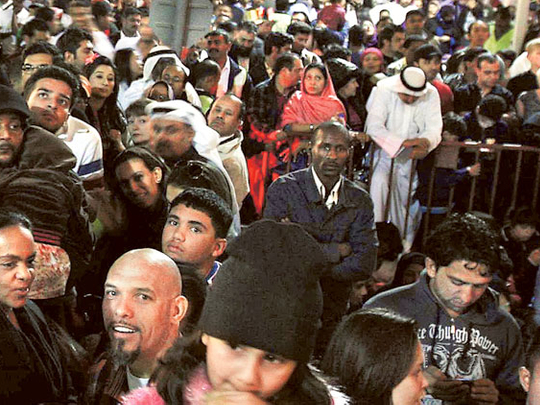
Dubai: While countries affected by the Arab Spring are still instituting stability, majority of Arab youth believe that their future looks bright, are very proud of their Arab identity, and for the second straight year, continue to look up on UAE as their most preferred country to live in and model country for their nations.
Released on Tuesday, the fifth Arab Youth Survey, commissioned by ASDA’A Burson-Marsteller and conducted by international polling firm Penn Schoen Berland (PSB), examines the concerns of 3,000 Arab youth aged between 18 to 24 across 15 countries in the MENA region.
Three out of four Arab youth (or 74 per cent) believe that “our best days are ahead of us.” A clear majority of the 15 countries are optimistic about the future, with Kuwait being the most optimistic at 82 per cent.
“The fifth ASDA’A Burson-Marsteller Arab Youth Survey illustrates that despite the negative media headlines attributed to the region, Arab Youth retain a strong sense of hope for the future and are determined to achieve a better life for themselves and their families,” Joseph Ghossoub, Chairman and CEO of MENACOM Group, said.
Nine out of 10 Arab youth likewise expressed they are “more proud to be an Arab” following the uprisings. Two out of three believe they are “better off” after the Arab Spring and that the recent changes it has sparked will positively impact them and their family.
“The first two findings are very new this year. And the fact that young Arabs look at their future with great amount of optimism, and the fact that they are proud to be an Arab is an outstanding new result that has come this year,” Sunil John, CEO of ASDA’A Burson-Marsteller, told Gulf News.
Model country
A third of the Arab youth picked the UAE as their top choice to live in for the second straight year, given 24 countries to choose from including the 15 countries surveyed and nine other prominent countries. The youth also regarded the UAE as a model country for their governments to emulate. John attributes these positive findings to the country’s cosmopolitan outlook, economic resilience, and wise leadership.
His Highness Shaikh Mohammad Bin Rashid Al Maktoum, Vice-President and Prime Minister of the UAE and Ruler of Dubai, seemed happy with the results, as expressed in his Tweeter post: “Pleased to know that the survey also showed that UAE youth, more than others, believe in their country’s ability to complete globally.”
“It is not about showing off. I truly believe we’re still learning and in the early stages. Our goal is to compete globally in all areas,” read another of Shaikh Mohammad’s tweet regarding the survey.
Outside the Middle East, France is the most favourable country for the Arab Youth, followed by Germany and China.
Recurrent social issues
While the Arab youth are highly optimistic about their future, some recurrent social issues continue to top their priorities such as getting fair pay, owning a home, and living in a democracy.
The region’s disturbingly high youth unemployment rate — at more than 25 per cent — have unsurprisingly affected the concerns of Arab youth. Forty-one per cent of respondents in the Gulf and 46 per cent in non-Gulf countries are “very concerned” about unemployment.
Following global trends, one in four Arabs believe they will be able to buy their own homes in their 30s while a surprising 15 per cent of Arabs believe they will never be able buy their own home.
“Of course the need for jobs, the need for homes, and the need for a good quality of life have been there for the last five years. So we think that those will continue to stay. The Middle East has challenges…I think this is where government and businesses need to work on,” John told Gulf News.
The rising cost of living worries the youth more at 62 per cent as opposed to economic issues, terrorist threats, Arab Spring events, or unemployment.








